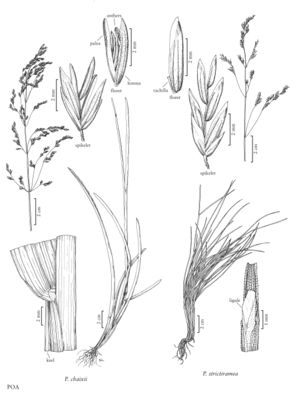Difference between revisions of "Poa chaixii"
FNA>Volume Importer |
imported>Volume Importer |
||
| (3 intermediate revisions by 2 users not shown) | |||
| Line 4: | Line 4: | ||
|publications= | |publications= | ||
|common_names=Chaix's bluegrass | |common_names=Chaix's bluegrass | ||
| + | |special_status={{Treatment/ID/Special_status | ||
| + | |code=I | ||
| + | |label=Introduced | ||
| + | }} | ||
|basionyms= | |basionyms= | ||
|synonyms= | |synonyms= | ||
| Line 38: | Line 42: | ||
|publication title= | |publication title= | ||
|publication year= | |publication year= | ||
| − | |special status= | + | |special status=Introduced |
| − | |source xml=https:// | + | |source xml=https://bitbucket.org/aafc-mbb/fna-data-curation/src/200273ad09963decb8fc72550212de541d86569d/coarse_grained_fna_xml/V24/V24_757.xml |
|subfamily=Poaceae subfam. Pooideae | |subfamily=Poaceae subfam. Pooideae | ||
|tribe=Poaceae tribe Poeae | |tribe=Poaceae tribe Poeae | ||
Latest revision as of 16:25, 11 May 2021
Plants perennial; densely tufted, not stoloniferous, not rhizomatous. Basal branching extravaginal. Culms 50-120 cm, stout. Sheaths closed for 1/2 - 3/4 their length, distinctly compressed, keels winged, bases of basal sheaths glabrous; ligules 1-2 mm, smooth or sparsely scabrous, apices truncate; blades (4)6-15 mm wide, flat or folded, apices broadly and abruptly prow-shaped. Panicles 10-20 cm, ovoid to pyramidal, open, spikelets numerous, with 3-5 branches per node; branches ascending to spreading, angled, angles densely scabrous. Spikelets 4-9 mm, laterally compressed; florets 3-5; rachilla internodes about 1 mm, scabrous, glabrous. Glumes distinctly keeled, keels scabrous; lower glumes 1-3-veined; calluses glabrous; lemmas 3.5-4.5 mm, narrowly lanceolate, distinctly keeled, scabrous, glabrous throughout, lateral veins prominent, apices acute; palea keels scabrous, glabrous; anthers 1.5-3 mm. 2n = 14.
Distribution
N.Y., Minn., Ont., Que.
Discussion
Poa chaixii was introduced from Europe as an attractive ornamental, and has occasionally escaped. A population in southwestern Quebec has been extirpated.
Selected References
None.
